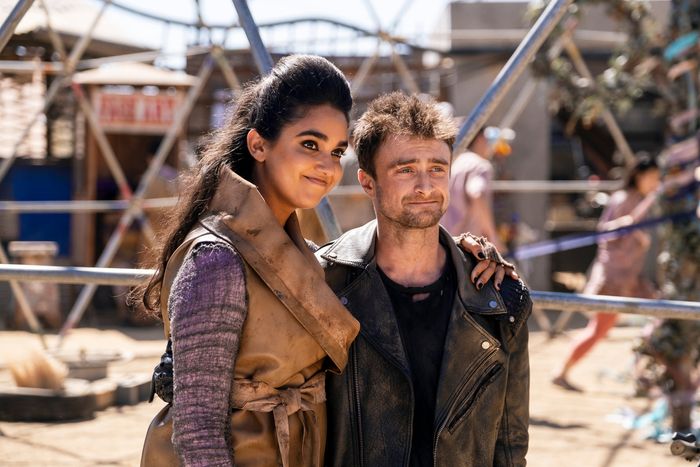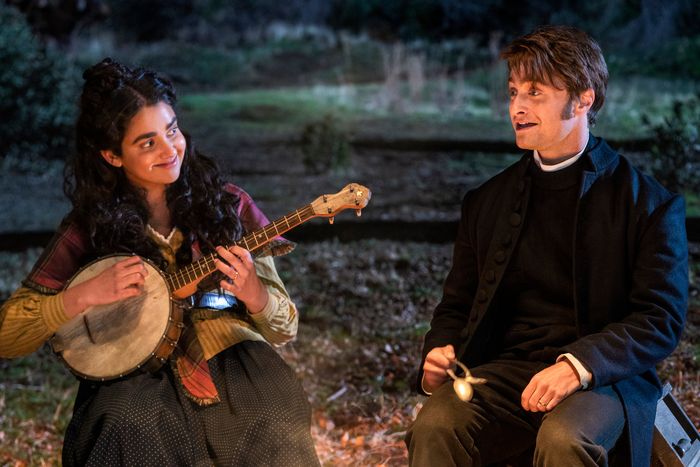
Spoilers follow for all four seasons of Miracle Workers, the series finale of which aired on TBS on August 28.
Whether the setting was Heaven, Inc.; the Middle Ages; the American Old West; or a postapocalyptic future, certain things were guaranteed in each go-round of Miracle Workers, the TBS series from creator Simon Rich that ended its four-season run this week. Steve Buscemi’s self-involved swindler would realize that his greed was hurting his friends; Karan Soni would get some sneering line deliveries as a disciplined loner; Jon Bass would abandon all pretense by playing an absolute moron. And, most gratifyingly, characters played by the delightfully paired Daniel Radcliffe and Geraldine Viswanathan would fall in love, into each other’s arms, and into bed. As Miracle Workers reset itself with each of its four installments, Radcliffe and Viswanathan’s chemistry was its beating heart, throbbing loins, and through-line, providing the narrative dependability that let the anthology get as inventive, weird, and dumb as it wanted.
Miracle Workers premiered on TBS back in 2019, at the tail end of a burst of original comedic programming for the network, including the police-procedural parody Angie Tribeca, the alien-abductee sitcom People of Earth, the millennial nightmare Search Party, the Tracy Morgan vehicle The Last O.G., and the raunchy road-trip series The Detour. They were goofy, actor-driven, and joke-packed — and all eventually canceled, partially thanks to the Warner Bros.–Discovery merger resulting in slashed budgets for TBS. Miracle Workers was the last one standing, and with its end, TBS will be entirely out of live-action scripted originals. Four years ago, though, the series about a group of angels working to stop a bored God from blowing up Earth felt more derivative than original. No matter that Rich was adapting his own 2012 novel What in God’s Name; the contemporaneous The Good Place was also exploring heaven, hell, human choices, and the meaning of life with a snappy pace and deep ensemble, and Miracle Workers’ sillier, breezier, sometimes grosser version of these questions felt a bit thin. Up against the philosophical weight of the trolley problem or the starry-eyed fatalism of Jeremy Bearimy, the lowbrow humor of Soni’s executive archangel helping Buscemi’s God clean up after pressed-juice-induced diarrhea or the meanness of God’s family mocking him for being illiterate didn’t have quite the same dramatic impact.
But within that abbreviated first season, Rich established two harmonious approaches that would turn out to be foundational to Miracle Workers once the series moved away from The Good Place similarities, adopted the anthology format, and started playing with genre. First was the series’ sense of humor: In Heaven, Inc., visual gags, puns, vulgarities, and absurdities abounded, like an episode about God deciding to explode Bill Maher’s penis and a confused conversation between the angels about why men have nipples. That talky style continued as Miracle Workers hopped around time and place with second season Dark Ages, third season Oregon Trail, and fourth season End Times, and its dialogue became driven by anachronisms that relied on engaged viewers picking up on all the references being thrown around. Progressive sociological concepts, pop-culture nods, and modern-day slang contrasted with the old-timey locations of Dark Ages and Oregon Trail, while sci-fi tropes from Tron, The Terminator, and Mad Max brushed shoulders with of-the-moment name-drops, like praise for Olivia Rodrigo’s album Sour, in the futuristic End Times.
Sometimes the formula felt a little simplistic, like Miracle Workers was picking the lowest-hanging fruit for an easy laugh: a singing bard, when directed to play a “party mix,” belting out “Party, party, party” over and over in Dark Ages; Soni’s gunslinger yelling at his horse for farting too much in Oregon Trail; humanity’s savior against robot-kind being named John Christ in End Times. The jokes were never that challenging, but they often had the pleasingly smooth-brained quality of every time Cunk on Earth brought up Belgian techno anthem “Pump Up the Jam,” and they evoked South Side committing to the bit with a multilevel-marketing cult obsessed with frosting. Miracle Workers was enamored with frivolity, and it had the freedom to do so because of the other correct choice Rich made early on: ensuring that Radcliffe and Viswanathan were always playing besotted lovers.
In the first season, the pair indulge in an opposites-attract crush, with Radcliffe as Craig, a neurotic angel in the Department of Answered Prayers afraid to solve miracles any bigger than helping people find their keys for fear of screwing up, and Viswanathan as Eliza, an ambitious and adventurous new co-worker who believes that they should attempt to solve more worldwide problems, but whose spontaneity often results in unexpected disaster. Each actor goes broad and big — Radcliffe all stammering awkwardness, repressed desire, and fierce loyalty; Viswanathan all spunky energy, encouraging affection, and hidden doubt — and they match each other’s comedic timing, outsize body language, and fluid movement through various tones in the same scene. There’s a little bit of unpredictable chaos whenever they get together because each is great at turning on a dime, with Radcliffe going from uncertain and self-effacing to brazenly confident and flamboyant, and Viswanathan retreating from bombast and bluster to self-analysis and doubt. Once Miracle Workers had that dynamic and the characters’ general outlines down, there were tons of places for them to go.
A dance in the Heaven, Inc. season led to a kiss in Dark Ages, with Radcliffe as a childish prince who only becomes interested in ruling when Viswanathan’s assertive “shit-shoveler” encourages him to defend their whole kingdom from an enemy invasion. The kiss in Dark Ages led to a lot of tongue-in-cheek sex scenes in Oregon Trail, when Radcliffe’s reverend finally admits he’s in love with Viswanathan as his already-married best friend. The best scenes of the season emphasize the contrast in their characters as they try to deny their feelings, like a fantasy sequence in which Radcliffe uses the Bible to fan Viswanathan’s exposed ankles (his hesitant excitement, her excessively moaning reaction) and a drunk-on-snake-oil Radcliffe changing into glittery hot pants and chaps to thrust and high-kick his way through an innuendo-laden performance of “She’ll Be Coming Around the Mountain When She Comes” in Viswanathan’s disbelieving-yet-impressed face.
Radcliffe stripping down (and fully flinging off any lingering Harry Potter associations) would become a Miracle Workers trend after that, with a later Oregon Trail scene featuring him dressed like Princess Jasmine at an Orientalist orgy, and an End Times bit in which he tears off his clothes to go “feral” in his tighty-whities. And each time, Viswanathan’s characters look on his antics with fondness and amusement, because Miracle Workers took the time to invest in these characters as endgame; no matter how few clothes Radcliffe wore or whatever lunacy happened around them, their love was the security in this story. In fact, the predictability of their relationship is exactly what gave Miracle Workers the ability to leap into new worlds. If there’s a pleasantly anticlimactic feel to Radcliffe’s desert orphan and Viswanathan’s bloodthirsty warlord defeating a robot army and welcoming a new baby in series finale “The End,” it’s because Miracle Workers never doubted the success of their partnership.
Instead, the stability of their bond was a central hub in the narrative wheel as Miracle Workers experimented with genre conventions: a woman-led army upending fantasy’s traditional patriarchy in Dark Ages, cannibalism among religious pioneers critiquing the American-exceptionalism myth in Oregon Trail, robot assassins competing against each other (and showing their own very humane vanity) in an America’s Next Top Model–style reality show in End Times. And the consistency of Radcliffe’s and Viswanathan’s adoring, lived-in performances let them be the foils to everyone else’s amped-up zaniness, like Soni’s deadpan and image-obsessed Lord Vexler in Dark Ages, Buscemi’s casually racist, self-described “white savior” Benny the Teen in Oregon Trail, and Bass’s overly enthusiastic, gimp-like pet Scraps in End Times.
The anthology format often means that seasons of a series are entirely disconnected from one another, with the commonalities between each installment just being a general theme; think of the myriad tortured cops on True Detective, the ghostly atmosphere of Mike Flanagan’s The Haunting duo, and Ryan Murphy’s American Horror Story, American Crime Story, and Monster franchises. Some share minor characters or locations but use those as jumping-off points rather than central concerns, like the Kansas City crime syndicate of Fargo or the Stephen King world of Castle Rock. But few of them do what Miracle Workers did so well, which was establish and deepen a core relationship while recurrently transforming everything else around it — a simultaneous promise of familiarity and creativity. The romance Miracle Workers held onto was its most useful storytelling asset, and always gave viewers something to believe in.



